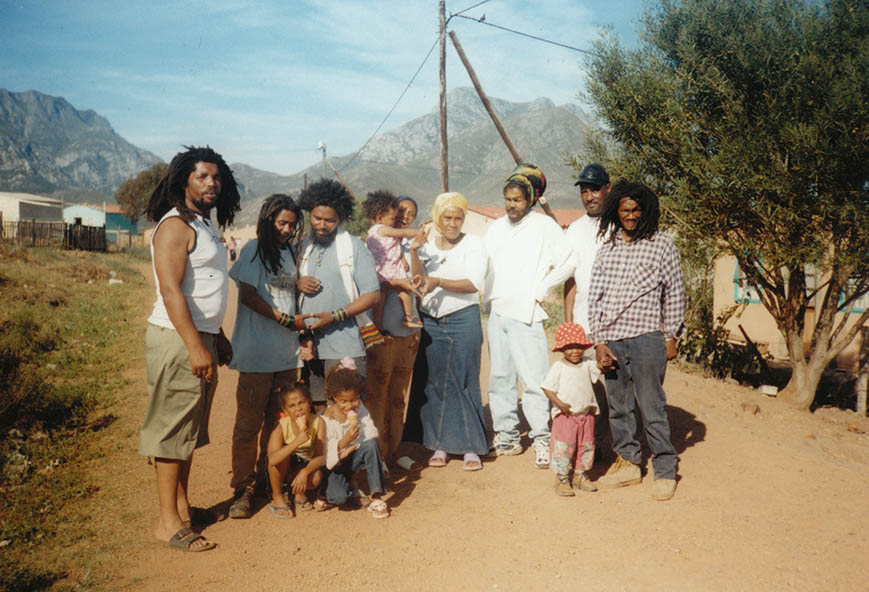MENZI MASEKO
See dem ah come - Anthemic Music
Until I listened to the Country Conquerors’ music, I had decided to no longer pay too much attention to most of South African Reggae. There have been way too many Bob Marley and the Wailers soundalikes, too many Peter Tosh imposters; I even know of an artist whose actual stage-name is Tosh-Marley. We overstand the hero worship, but where is the authenticity?

Needless to say, South African Reggae Artistes are not the only ones caught up in this malady of mimesis. There are artists from every part of the world who simply do not mind sounding like the next person, perhaps they misunderstood the real meaning of the term I and I. After having worked tirelessly as a promoter for various Dancehall, Hip Hop and Reggae musicians in KwaZulu Natal, I had heard too many clones, that is until I heard a song called Die Anthem. There is something noble about artists ensuring that their music remains truly original and representative of their own milieu.
The sounds of this band are so unmistakably Cape infused or should I say “Kaapie”. Reggae music can be deceptively simple, but that simplicity can often be merely a lack of skills. Not so with this band. In the aforementioned song, the simple churn of the organ opens up for the pounding and driving bass and drum which forms the marching band stylized backdrop. It’s when the lead guitar begins to narrate the sufferer’s lamentations that you know you are listening to an atypical reggae band. A full three and a-half minutes of what sounds like the band warming up and checking their levels is actually just an introduction to decidedly un-reggae sounding Kaapse party tune that would get any party jumping. Let’s just say that Die Anthem is a six-opus interlude that is guaranteed to evade anyone’s preconceptions of what reggae music is supposed to sound like.

The first tune I ever heard from the Country Conquerors was See dem ah come. As a bass-head, I was impressed by the fluid and playful exuberance of the bassist in this band, Marshall Rinquest a.k.a. Tuff. Not only does he complement or harmonize in synchronicity with the almost jazz-like drumming of Taswill Strydom, he makes the whole tune roll along like thick lava rolling down the mountain.
The positive message in the music is affirmed by the lyrics that fortify and assure the wicked that the upright will never get weary or turn away in times of trouble. When the calm and collected vocalist chants “See dem ah come but we nah run …”; it’s a testimony of battles faced and won. The victorious sound in the closing seconds is a confirmation of victory of good over evil.

Tuff the bassist has a jazzy sensibility that together with the drummer gives the band a rather mature and warm sound. I am also stating this solely from listening to the Conquerors Dub, it sounds more Reggae Anthemic than the tune which is actually called Die Anthem. Very Augustus Pablo or early Scratch Perry sounding – meditative and calm with an uplifting vibe to it.

While it may be difficult to trace the real roots of Reggae in Southern Afrika, the genre has had a tumultuous time reaching the mainstream audience. Aside from the outstanding Reggae troubadours, such as Carlos Djedje, Colbert Mukwevho and Jambo. Reggae had remained more of a sub-alternative genre even listened to more by Rastafari, Stoners, Hippies and much undocumented working-class folk. While you may find that there is someone in every household who actually really enjoys listening to Reggae music beyond Lucky Dube, Bob Marley and Burning Spear – the fact that Radio stations and mainstream media simply chooses to ignore this music and its significant audience is an indictment of the type of society we have been conditioned to accept.

Bands such as the Country Conquerors and a myriad others have come and gone without due respect or media representation simply because they represent a culture that does not fit the status quo.

Reggae is in some sense a hidden treasure which is in not so plain sight. Not only does the sound represent the amalgamation of various types of music into a distinctively tasteful gumbo, or ghoemba – it fuses these sounds and elements of social protest and positive messages for a purpose; but alas, many who listen to the radio stations today would never discover this unified purpose because they have been programmed to imbibe only the flavors of the moment.
The reggae sound is not based on instant gratification, material pursuits or pop-culture; it is the sound of traction, uprightness and ancient yet futuristic identity. Country Conquerors like the great Reggae artists we have such as The Meditators and the Rudimentals, all represent a Rasta Reggae sound that celebrates life while also shining a light on the plight of the downtrodden.

Reggae is an assurance that Better Must Come. Despite the troubles that may stand in I and I way, there is no beast that cannot be Conquered. I and I are convinced that Reggae is the universal drum telegraphy designed intuitively to broadcast messages of a utopian possibility here on planet Earth. It comes from the people and it remains for the people, crossing enforced boundaries of race, creed and even needs travelling at heart-speed. When one traces the history of Jamaican Reggae, it is not difficult to see how this music has its roots in the plantations and Spiritual sorrow songs that later became known as the Blues.

Videos and photos by Aryan Kaganof.